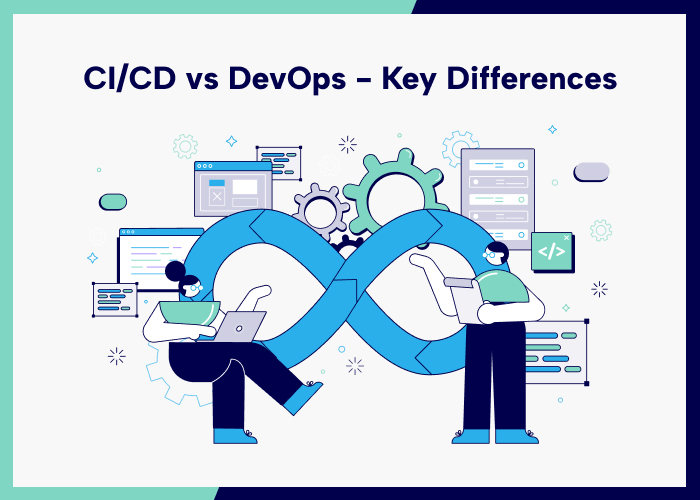What is CI/CD?
CI/CD stands for Continuous Integration/Continuous Deployment. It is a collection of procedures, guidelines, and automated methods used in software development and deployment to expedite the timely, dependable, and frequent delivery of code changes to production settings.
Continuous Integration (CI):
- Code changes are automatically created, tested, and verified in a common repository, like Git when they are routinely integrated. This process is known as continuous integration (CI).
- Every day, or whenever they finish a job, developers commit their code modifications to the repository.
- Code compilation, dependency resolution, and automated test execution (unit, integration, etc.) are all done throughout the build phase to make sure that the latest modifications haven’t created any flaws or regressions.
Continuous Deployment (CD):
- CD is the practice of automatically deploying code changes to production or staging environments after they have passed through the CI pipeline.
- Once the code changes have been built, tested, and validated through the CI process, they are automatically deployed to the target environment(s).
- CD pipelines are configured to automatically promote code changes through different environments based on predefined criteria and quality gates.
- Automated deployment tools, such as Kubernetes, Docker, Ansible, or AWS CodeDeploy, are commonly used to orchestrate and automate the deployment process.
What is DevOps?
DevOps dismantles the conventional divisions that exist between the teams responsible for software delivery—development, operations, quality assurance (QA), security, and other teams. It encourages an environment of openness, shared accountability, and constant development so that companies may produce software more quickly, more consistently, and with greater quality.
CI/CD vs DevOps – Key Differences

- CI/CD focuses primarily on the automation of software delivery processes, specifically the integration and deployment phases. On the other hand, DevOps emphasizes collaboration, communication, and integration between development and operations teams throughout the entire SDLC.
- CI/CD’s primary goal is to deliver high-quality software more frequently and reliably. DevOps aims to promote shared responsibility and foster a culture of continuous improvement.
- CI/CD tools include version control systems, build automation tools, testing frameworks, containerization platforms, and deployment automation tools.
- DevOps tools encompass a broader range of technologies, including collaboration tools, configuration management tools, infrastructure as code tools, monitoring and logging tools, and incident management tools.
CI/CD vs DevOps – Benefits
- Through constant integration of code revisions, developers may quickly find and fix errors and loopholes in the early phases of the development process.
- Companies can provide risk-free features, functions, and bug fixes by automating.
- Organizations may drastically reduce the cost of addressing errors and flaws by identifying and fixing bugs early.
Advantages of DevOps
- By automating the processes, DevOps techniques and various technologies, such as Azure DevOps, enable development teams to deliver software more quickly, cutting down on the total amount of time needed to provide new features, upgrades, and bug fixes.
- Cloud computing and containerization are examples of DevOps approaches that enable businesses to quickly adapt their software to changing business needs.
CI/CD vs DevOps – Conclusion
In conclusion of the CI/CD vs DevOps blog, separate but complementary functions, CI/CD and DevOps are both essential components of contemporary software development processes.
While DevOps stresses cooperation, communication, and integration across development and operations teams to allow quicker and more effective software delivery, CI/CD focuses on automating the process of delivering code changes to production environments rapidly and reliably. Organizations may effectively deploy CI/CD vs. DevOps methods and technology to meet their software delivery objectives and achieve commercial success by knowing the fundamental distinctions and advantages between the two.
FAQs
How can organizations ensure successful implementation of CI/CD practices?
What are some common challenges faced when adopting DevOps principles?
What role does security play in CI/CD and DevOps practices?
How does CI/CD contribute to improving software quality?
What are some strategies for scaling DevOps practices in large organizations?
Ravi Bhojani is the Chief Marketing Officer (CMO) at Alian Software, where he spearheads the company’s marketing strategies and drives its brand presence in the competitive IT services landscape. With over a decade of experience in the technology and marketing sectors, Ravi has consistently demonstrated his ability to blend innovative marketing techniques with deep industry knowledge to deliver outstanding results.